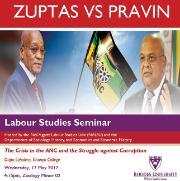
Oupa Lehulere delivered a seminar entitled “The Crisis in the ANC and the Struggle against Corruption” in the 17th May 2017 as per of the Labour Studies Seminar Series. The series is jointly co-ordinated by the Neil Aggett Labour Studies Unit (NALSU) and the Departments of Sociology, History, and Economics and Economic History.
The Author
Oupa Lehulere is an activist in the social movements and is currently based at Khanya College, a social justice and movement building institution based in Johannesburg, South Africa.
THE PRESENTATION
Monopoly capitalists and their allies in the ANC have corrupted something very precious in South Africa’s history - the proud and militant tradition of struggle for social justice. They have corrupted the dream of a free and egalitarian nation. For over two decades, the ANC has presided over entrenched corruption, which must now be resisted. But that struggle will constitute a whole new historical epoch.
In the public domain – and particularly in the media – the focus has been on the most visible part of the problem: the Zuptas. Indeed, Pravin Godharn and his bloc in the ANC have been held up as models of good governance and clean government who will save South Africa from its ‘descent’ into a banana republic. No connection or relationship is established between the corruption of Zuma and his supporters in the ANC, and Gordhan and his “clean governance”.
At the heart of the Zupta versus Pravin battle is a battle between two kinds of corruption. On the one side is a corruption that has not yet been able to legalise itself, a corruption of excluded sections of the black middle class and those who aspire to be rich capitalists. At this point this corrupt faction steals directly from the poor, but it seeks to legalise itself and ‘play’ in the greener pastures of corruption in the circuits of wealth that move within the capitalist class and the state itself. On the other side stand the front troops of legalised corruption – the corruption of white monopoly capital. Behind their appeal to the ‘rule of law’, to ‘clean government’, to ‘anti-corruption’ stand the defence of privilege that has not only excluded aspiring black capital, but has produced a deep, structural and enduring poverty of millions of working class South Africans.
